Portlanders have heard a lot from powerful voices opposing the City’s Our Streets Transportation Funding effort that looks to raise $46 million a year in transportation revenue via an income tax and fees on businesses. Now, a coalition of health, environmental, and transportation advocacy groups have released a letter in support of the plan.
The groups applaud City Council for creating what they call, “good public policy” that “addresses existing regressive transportation fees and taxes and the inequitable distribution of public resources by exempting our lowest income households, dividing the revenue burden equally between residents and businesses, and steering a majority of the revenue to the areas of the city that have for too long been neglected and are unsafe.”
Here’s more from the letter:
“As with most collaborative efforts, compromise is often required, and we believe the city has made substantial concessions to the business community in order to bring this policy framework forward. We are disappointed that the business community continues to publicly oppose this proposal despite these concessions, and as the public conversation continues, we anticipate further complaints from wealthy residents and business interests, including threats of referral.
Should a proposal eventually be referred to voters, our willingness to join the “Yes” campaign and invest resources in upholding this proposal will likely depend on whether the City Council passes a truly progressive package, one that is fairer for the middle class and places a stronger emphasis on safety.
Given our support, and given that the concessions afforded to the business community have not secured the level of support intended, we recommend that City Council amend the proposal to ensure that working families and middle-class households are not burdened at the expense of the wealthiest among us, who can clearly afford to pay more.”
Advertisement
The letter reads like a pre-emptive strike against further concessions Mayor Hales and Commissioner Novick might be planning to make to curry favor with the Portland Business Alliance and others who oppose the plan.
The coalition is also against Council amending the proposal to include a sunset clause. Some critics of the plan see such a clause as a way to re-assess the program and/or stop the new taxes and fees if they prove to be unpopular. Hales and Novick have resisted that, saying that an ongoing revenue source for transportation infrastructure is too important to take off the table.
Here’s a list of the coalition members who signed onto the letter (many of whom plan to testify at City Council when the plan gets a public hearing starting at 2:00 pm today):
- Jason Miner – Executive Director 1000 Friends of Oregon
- Rob Sadowsky – Executive Director Bicycle Transportation Alliance
- Mara Gross – Executive Director Coalition for a Livable Future
- Jonathan Ostar – Executive Director OPAL Environmental Justice Oregon
- Noel Mickelberry – Executive Director Oregon Walks
- Chris Hagerbaumer – Deputy Director Oregon Environmental Council
- Karianne Schlosshauer – Pacific Northwest Regional Policy Manager Safe Routes to Schools National Partnership
- Heidi Guenin – Policy Manager, Transportation & Land Use Upstream Public Health
Stay tuned for more coverage from today’s Council hearing. Learn more at OurStreetsPDX.com.



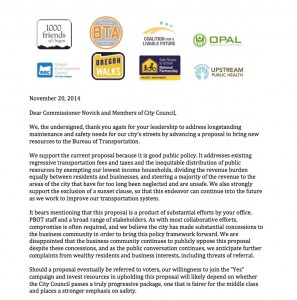
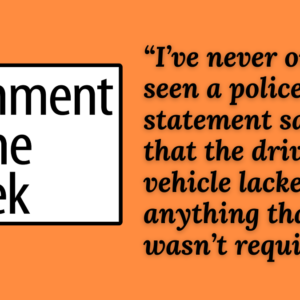
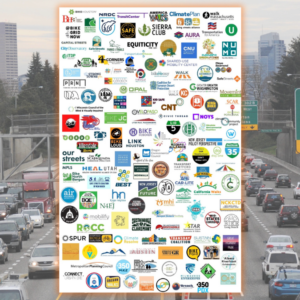
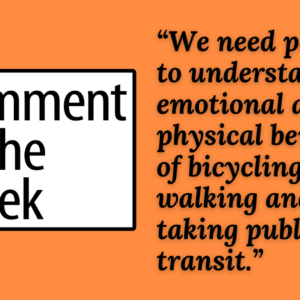
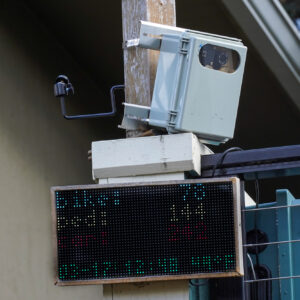
Thanks for reading.
BikePortland has served this community with independent community journalism since 2005. We rely on subscriptions from readers like you to survive. Your financial support is vital in keeping this valuable resource alive and well.
Please subscribe today to strengthen and expand our work.
Us little folks will be sour to some of these businesses. Can we get a list of the opposition?
I oppose it. It still does not address businesses and residents outside (Vancouver, Hillsboro, Beaverton, Clasckamas etc.) the city, who drive daily on our roads to work. Think of the contractor from Camas, who operates an unnecessarily large supercharged Dodge Ram pickup truck… shouldn’t that guy fork out money to be making an impact on our roads?
Exactly!!! Our city council is too cowardly to address that issue however.
Thats a completely different discussion– we need tolls for people who use our roads and live outside the city. This, however, is a tax intended to serve the people being taxed. Infrastructure isn’t made by fairies. Additionally, the skew to benefit cars must be eliminated. We need multimodal infrastructure funded all over the city: road diets, bike/ped amenities, density. Congestion leads to safety due to slower speeds.
Either way, muddying the waters about commuters doesnt solve the shortfall nor the beefing up of our needed multimodality. Yes, people who commute use our roads– that’s an entirely different issue from our community paying for our infrastructure.
Want them to pay? Tolls.
Exactly. Let’s collect a toll from everyone for every mile driven. And let’s make that toll just a bit greater for those who drive bigger, more dangerous, inefficient vehicles. Let’s collect it using a proven, very cost-effective system that’s already in place. Ta da! A gas tax!
We’re not “muddying the waters” by demanding that non-resident commuters pay a fair share. Our system would be in much better shape and would be smaller if it weren’t for the use of the Portland infrastructure by non-resident commuters. We need the traffic calming, road diets, and pedestrian crossing enhancements because there’s so much traffic on the roads.
How do you plan to collect such a toll? and what does your collection method cost?
It’s a gas tax. It’s collected from the consumer at the pump. It’s collected from the wholesale distributor for the state. It’s been in use in Oregon since 1919.
Even if they succeed, I think this is going to die based on how it’s collected. Nobody wants a “surprise” bill for $100+ — think Multnomah County ITAX.
If they could roll it into property taxes, water bill, gas tax, state income tax, or even require employers to deduct it with payroll, then they’d have a *much* higher success rate in keeping this around.
Nobody misses $5 from their paycheck, but show them a surprise bill for $120 at the end of the year and there will be a battle cry to repeal it.
Maybe you don’t miss the $5, but there are certainly some that do. Especially when you add up all the $5 additional taxes Portland residents keep seeing.
Roll it into a sales tax or a county gas tax.
Low income does not mean low impact on the roads. Plenty of low income folks operate vehicles. They should contribute as well.
A gas tax increase is BETTER public policy!
A gas tax increase provides a slight incentive to reduce:
fossil fuel consumption,
air pollution,
miles driven,
use of oversize vehicles, and
migration to the suburbs.
An income tax levied on Portland residents does none of these things.
There are tens of thousands of suburban commuters who drive on Portland roads daily who will pay NOTHING under the income tax proposal.
The city of Portland predicts they will have to add 22 people to the Revenue Bureau to collect the income tax. Implementing a Portland gas tax or increasing the existing Multnomah County gas tax (which is shared with Portland to the tune of $26 million per year) would cost basically nothing since the system is already in place.
Increase the gas tax at the local level, the state level or both. If you’re really worried about the regressive nature of the gas tax, provide an exemption from the Arts Tax for low income Portland residents.
An amendment of 2009’s statewide gas tax increase was a ban on localities enacting separate/additional gas taxes. So that idea is out.
No, Todd. You are incorrect.
HB2001 adopted by the legislature in 2009 had a TEMPORARY prohibition on new or revised local option gas taxes. That prohibition EXPIRED on January 2, 2014.
Relevant sections of HB2001 are:
SECTION 25. (1) A city, county or other local government may not enact any charter provision, ordinance, resolution or other provision taxing fuel for motor vehicles. (2) A city, county or other local government may not amend any charter provision, ordinance, resolution or other provision taxing fuel for motor vehicles.
SECTION 26. Section 25 of this 2009 Act is repealed on January 2, 2014.
I have a question on the gas tax, hopefully an answer can be found here (or at least discussed).
Say I commute into Portland every day from my home in Canby. I purchase all my gas at the station closest to my house.
Will the proposed increase in gas tax be on just gas purchased in Portland, to be used for Portland’s roads, or would this be a statewide gas tax to be used statewide?
If the former, how is a gas tax going to get anything from commuters who purchase their gas close to their homes, or chose to purchase gas outside of the Portland city limits?
If the latter, how will Portland be able to get the dollar figures they need from the gas tax without other communities/cities/counties crying foul? Should Portland get a bigger share of the gas tax pie if it’s a statewide tax? Why?
Oregon’s transportation budget is drawn from a number of revenue sources, including gas tax, truck weight mile taxes, driver and vehicle license fees, etc. In addition to funding ODOT, these fees collected on the statewide level are shared with cities and counties. There’s a complicated negotiation that results in formulas to split the revenues.
An increase in the state gas tax (or an increase in any of the other fee programs) would almost certainly result in additional shared revenues for cities and counties.
There are also two counties (Multnomah and Washington) and more than a dozen cities that have local option gas taxes. The Multnomah County gas tax revenues are also shared with its cities according to some formula. A local option gas tax is for use by the adopting jurisdiction. Some have a straight cents-per-gallon structure. Coburg exempts diesel. I think that one only collects during part of the year.
If you never buy gas in Multnomah County, you don’t pay into Multnomah County’s local option gas tax. Anytime you buy gas anywhere in Oregon, you are contributing, based on the shared revenue formulas, to the gas tax revenues for every city and county in the state.
Learn more about the ODOT budget and sharing of revenues at:
http://www.oregon.gov/odot/comm/docs/budgetbooklet_11-13.pdf
I do understand all that. Thank you for posting it.
My question, I guess, is aimed at people who want to use increased gas taxes to replace the Portland street fee idea, and the people who want the commuters to Portland to also pay their “fair share” for the roads of Portland.
If the idea of a gas tax for Portland is local-only to Portland, then you still aren’t going to capture funds from the commuters– they could and probably would choose to purchase gas outside of the city limits, thereby circumventing the gas tax to fix Portland’s roads.
Non-Portland residents will at least occasionally buy gas in Portland thus contributing something to the Portland transportation funds. I occasionally buy gas in Eugene and Tigard (two of the 14 cities with a local gas tax) and contribute a dollar or so to their city revenues when I do so. I’ll take the occasional contribution by non-residents from gas tax rather than the NOTHING from the Novick-Hales income tax.
Giving the city’s voting history and the fact that 45% of citizens will pay nothing under the proposal I think it has a very good chance of succeeding at the ballot. If they were worried at all about winning they could just exempt 75% of the citizens and have the remaining 25% pay up. Tax my neighbor for the roads I use is a winning argument if I ever heard one.
Let’s see, the Street fee is going to cost me $5 per month and my BTA membership is (or was) $5 per month.
Hmmm, well at least I know I won’t be out any additional money.
What about a voluntary crowd-funding approach? I’d totally chip in $100 a year (or more, when I could) toward a dedicated fund for building some real cycling infrastructure, with some sort of a guarantee that the money would be used on specific types of bike projects throughout the city. Likewise, if paving roads is so important to those freight-focused individuals and companies, they can figure out how much it’s worth to them personally and contribute accordingly. And there shouldn’t be any reason why the city couldn’t accept contributions from road users that live outside the city limits.
While the street fee might be good public policy, a no-vote income tax is not. It only gives future city councils the incentive to do the same for whatever the cause of the day might be. Sorry BTA, OR Walks, et al, you just lost my support.
That’s my biggest fear with the proposed income tax. What will stop the council from adding more and more unrelated funding wants to the tax? Soon, it will be as much as, or more than, our state income tax.
The gas tax requires less overhead to collect, will have better compliance, and it’s directly tied to transportation choices that cause the bulk of the damage to our road system.
There’s nothing to keep this or a future council from changing the rates, changing the exemptions, or completely changing what the income tax is used for. They could divert the entire income stream into non-transportation programs.
Just think if all the political capital being spent right left and center on this had been focused on something sensible, something with a future, something that financially penalizes the activity that is the chief source of wear and tear and danger on the roads that (a) apparently need repairing, and (b) need to be made safer? Oh, and could raise ten times as much money as this piddly effort is going to raise.
What a waste of time and energy!
Well said J_R, we now need to get this on a Billboard…
“J_R November 20, 2014 at 12:58 pm
A gas tax increase is BETTER public policy!
A gas tax increase provides a slight incentive to reduce:
fossil fuel consumption,
air pollution,
miles driven,
use of oversize vehicles, and
migration to the suburbs.”
“Let the perfect be the undoing of the good”; tho I’d rate the street fee as maybe good minus.
That seems to be the prevailing sentiment here. Folks seem to be saying “It’s not perfect, so I oppose it. Let me instead provide you with a complicated, unworkable or politically DOA alternative.”
Surprising to find not a single commenter in support. And interesting that the “it’s not perfect” argument is the same line the Oregonian is pushing.
“Let me instead provide you with a complicated, unworkable or politically DOA alternative.”
I won’t speak for anyone else, but for me, I am not in favor of this—any version so far presented—simply because it
– is administratively very costly—22 new positions in the revenue dept?!;
– doesn’t raise anywhere near the money the folks pushing it say we need just to tread water;
– fails to discourage driving *at all*;
– has taken seven years of staff time(!) to get to this point;
– can’t help but dim the prospects of any real solution to our fiscal crisis in transportation by putting on display for all to see just how slapdash our elected officials approach something like this, lurching from one kooky idea to another;
– doesn’t account for or even acknowledge the biggest thing to hit transportation in about a century: climate change and the looming end of cheap gasoline;
– provides zero incentive to those contemplating ditching their car, as any serious gas tax would;
I find it amusing that you would consider *alternatives* to what Hales and Novick have proposed, and then counterproposed, over the past year+ as unworkable. Just look at the hash they’ve made of this. There is nothing a priori unworkable about giving a lusty bump to the languishing gas tax. It is done in nearly every other country, regularly. And it will be done here too, soon enough, all the energy expended on this here Street Fee/Fund notwithstanding.
Hear, Hear, 9 Watts!!
Our Portland political leaders have no vision, possess no serious budgeting process, and no real commitment to a carbon action plan that directly addresses carbon emission reduction, such as an explicit policy that dramatically is designed to reduce our habits of driving private autos everywhere, even as so many do for just driving to a local store in a 3,000 to 4,000 pound vehicle to pick up 20 pounds of goods.
Our modern carbon-based lives are simply absurd as they destroy the ecosystem of the Planet upon which we are totally dependent for our survival. The big Mother, the Gaia, will correct us, possibly by assuring our elimination, or near so, if we do not seriously choose to transition to a non-carbon economy.
Weight-mile tax, assessed at the DEQ or DMV when one goes to register one’s motor vehicle – gas fired or not, to catch the hybrids and EVs. Don’t want to pay it all at once? Pay on estimate and reconcile when you register. Statewide.
“to catch the hybrids and EVs”
Red Herring.
Hybrids use almost as much gasoline as the rest of our fleet. Why make complicated rules to second guess the minute fuel economy differentials?
As for EVs, we have a teeny, tiny number of those zipping around. If we’re concerned about them, how about stopping the ridiculous, and at least the last time I checked, *very* generous subsidies offered to buyers of these, who in any case are almost always wealthy to begin with. Average income of a Chevy Volt buying household $175,000/yr. = what Leah Treat makes.
12,000 miles/yr /40mpg = 300 gal x $0.514 = $154.20
12,000 miles/yr /24mpg = 500 gal x $0.514 = $257.00
The difference is just over $100/yr. How much is the design, administration, and overhead associated with the weight mile tax going to cost, per hybrid car?
System requirements. Policymakers must decide what functions mileage fee systems should support, such as varying fees by location and time of travel, providing value added motorist services, or offering various forms of privacy protection.
Technical design. A mileage-fee system must provide mechanisms to meter mileage, collect fees, prevent evasion, and protect privacy. There are numerous technical design options, each with different functionalities, levels of privacy protection, and costs of implementation and administration. For example, mileage fees based on annual odometer readings eliminate the cost of in-vehicle equipment and reduce privacy concerns, but might entail higher labor costs to conduct the readings. Mileage fees based on sophisticated in-vehicle equipment can enable location-based mobility apps, but may engender privacy concerns and increase the system’s capital costs. If different states choose different technical options, the systems should be interoperable—that is, able to collect and apportion fees for interstate travel.
Institutional structure. Appropriate institutional roles for government agencies and the private sector also need to be defined. Should the private sector be viewed solely as the source for technology procurement or should it also have a role in managing accounts and collecting revenue on behalf of the government?
from http://www.uctc.net/access/43/access43_fuel_taxes.shtml
Just raise the tax and index it to the 3x cost of asphalt.
Cheaper, quicker, simpler.
What about your out-of-state mileage? If it’s not based on GPS technology (with the supposed privacy concerns) everyone who does even a modest amount of out-of-state travel would need to file paperwork or provide proof they’d paid gas taxes in other states. How much effort will that take? How many new employees would be required at the state to evaluate these claims and documentation? How many people would you expect to disconnect their odometers?
If you think there are significant revenue losses due to electric vehicles, do what Washington and some other states do – have a higher annual registration fee for electric vehicles. Or simply eliminate the $1500 tax credit Oregon provides to encourage purchase of electric vehicles.
So is this tax an additional $46 million to the existing budget or will it be the ol switch-er-oo where they raise the $46 million and the existing street budget gets placed into another fund in the budget? Has that been made clear?
I find it dismaying to see support for this fee from these organizations. I haven’t had a car since 1990 – it makes no sense I should pay as much as someone who has been driving around in an SUV for a couple of decades. We have one of the top 10 worst urban heat island effects in the country in Portland, according to a recent study by Climate Central, and unhealthily dirty air downtown, according to DEQ. It actually makes me queasy to know I’ll be paying to help aggravate these problems, and to enable other people accelerate climate change. I won’t support a policy that does nothing to discourage driving.
” It actually makes me queasy to know I’ll be paying to help aggravate these problems, and to enable other people accelerate climate change. I won’t support a policy that does nothing to discourage driving.”
Well articulated. You get my vote for comment of the Week. I love how many angles commenters here come up with that I hadn’t thought of. Makes my day!
The problem I see with many critics of this plan is that they think it’s the only thing PBOT is doing to address the transpo funding shortfall.
This is only one piece of the puzzle.
PBOT is actively working on other stuff too – like parking reform, that will raise more money and will do more to encourage certain road uses over others.
Calling on PBOT to meet everyone’s needs and desires in one fundraising plan is a bit crazy IMO. It’s just not realistic. Not only is compromise necessary to pass something like this… But again, it doesn’t mean that all these other ideas won’t be/can’t be pursued along with it.
Oh, and BTW, there’s a very very very good chance that the state will enact a new gas tax in 2015 so there’s that.
“PBOT is actively working on other stuff too ”
I’m thankful for that, and for your reminding us of it. However, as you know this particular project has received top billing (it’s own PBOT website, seven years of staff time, public hearings, major showdowns in various public forae, high and might pronouncements especially from Steve Novick, etc.) which to my knowledge no other policy matter has received in recent memory. The way this has been packaged and sold gives every indication that this is IT. I don’t recall much in the way of comparative language suggesting that this is part of a package of measures, even as this may turn out to be so.
“Calling on PBOT to meet everyone’s needs and desires in one fundraising plan is a bit crazy IMO.”
What is crazy is choosing as your one big policy push something the pushers haven’t thought through, that is not tied to anything proportional to infrastructure deterioration, that is very hard to defend on its merits, that is sounding quite costly, that keeps shape shifting.
I think saying that it should meet everyone’s needs and desires is a straw man. I think any policy given one-quarter this much public money to sort out should be held to a set of standards MUCH higher than those relied on in this case.
So, does anyone actually think the Oregon legislature will step up with enough of an increase in the state gas tax to actually make a difference?
As I’ve explained repeatedly on this forum, since 1993, the federal gas tax has not changed; the Oregon gas tax has been increased by 25 percent; and the cost of street, highway and bridge construction has increased by 70 percent (Source: Corps of Engineers’ Construction Cost Index). Based on the construction cost index, the Oregon gas tax should ALREADY be at 41 cents per gallon and should have increased at the rate of about a penny per year.
I’m not content to accept a new funding mechanism (city income tax), that will cost something upwards of $2 million per year to collect (based on 22 new Revenue Bureau employees @ $100 k with benefits), that will likely have a non-compliance rate of about 30 percent (like the Arts Tax), and that is not even committed to fund transportation system operations, safety and improvements.
I stood up at one of Mayor Adams’ and Chair Wheeler’s open house forums on the last round of transportation infrastructure programs and told them I’d support ANY increase in gas tax they put forward and opposed what they were calling the street fee.
So, we’re supposed to sit here and wait for the legislature to increase the gas tax by what? 3 cents per gallon? Maybe 5 cents? And because they might do this, we should accept a new, costly-to-administer income tax instead of a local option gas tax? I don’t think so.
You’re right, J_R. They are going to cook up some tiddlywinks gas tax hike of 5cents like you say. Then, in a few short years, all hell’s going to break loose: the fracking bonanza will have played out; gas prices will go through the roof; and we’ll once again be caught with our parameters down, with no card to play.
Thanks to very unimaginative policies (Street Fee/Fund) our dependency on a sunsetting technological system will have budged hardly at all from today’s levels, and the mad scramble will commence. But we will be out of options. There will at that point be no smooth landing, no win-win. Biking will of course carry the day, as it already does for some of us, but at the policy level we’ll be dead in the water.